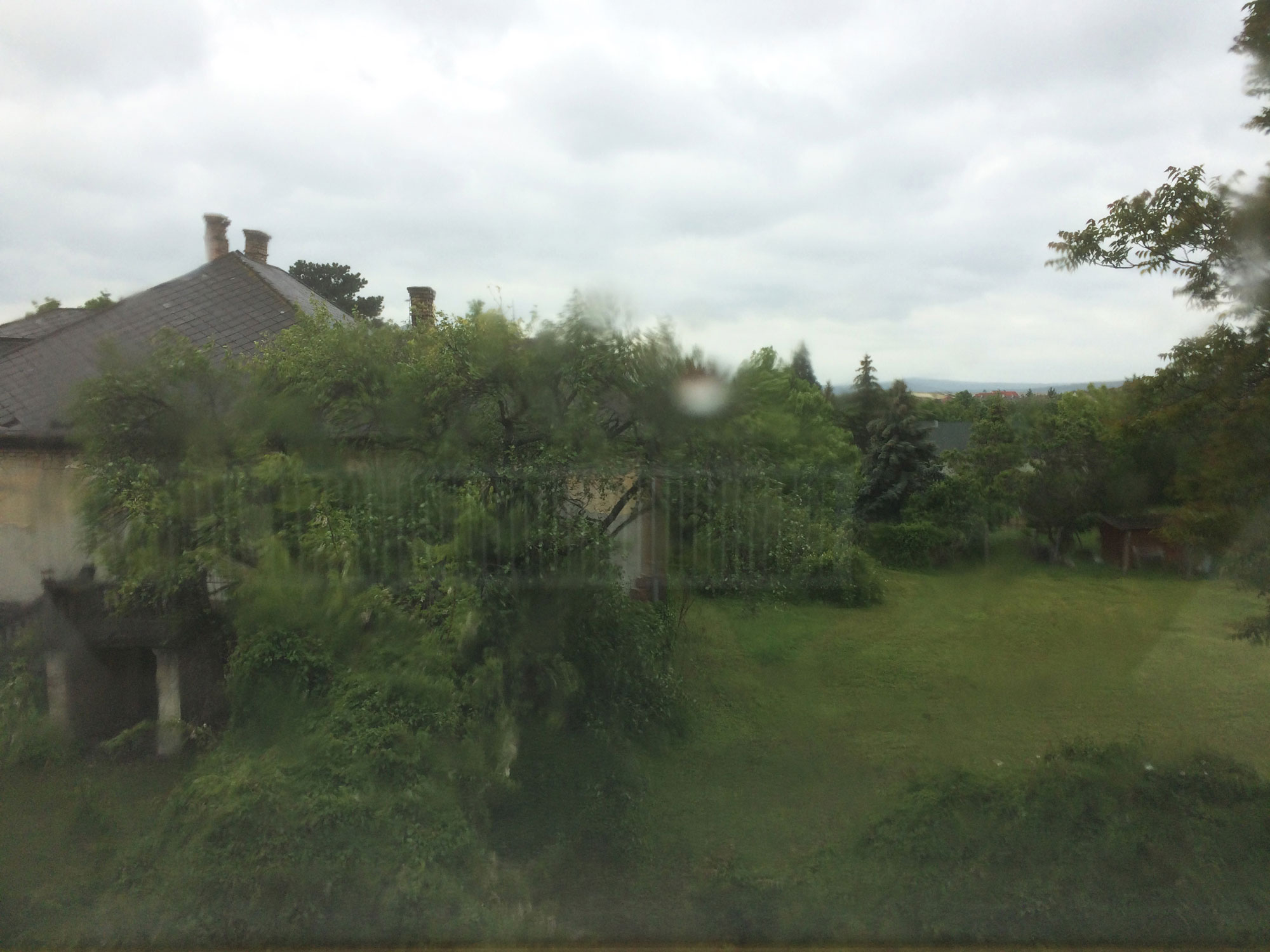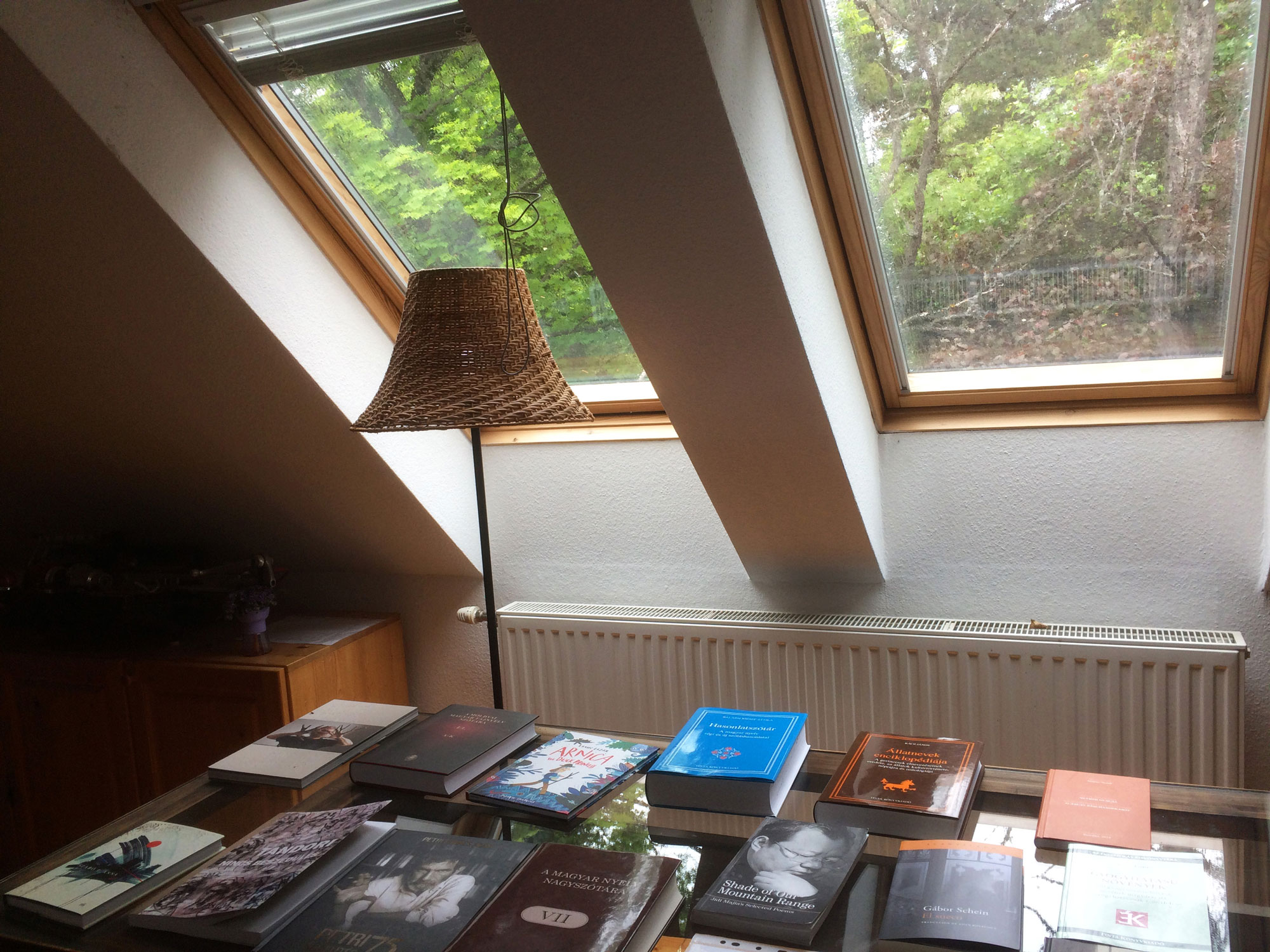In May, Associate Programme Director Kate Griffin travelled with Anna Goode of the British Centre for Literary Translation to Hungary for the annual meeting of the RECIT network, which brings together translation centres from across Europe to share ideas and inspiration.
Early one Monday morning, Anna and I left the warm sunshine of East Anglia and landed in the rain of Hungary. We’d been warned about storms but the skies above Budapest seemed unaffected and our landing was smooth. Waiting for us at the airport were Péter Rácz and Gábor Schein from the board of Magyar Fordítóház Alapítvány, to take us to their Hungarian Translators House in Balatonfüred.
Balatonfüred is two or three hours’ drive south from Budapest, depending on the traffic. Our view shifted from the industrial outskirts to Soviet-style apartment blocks, gradually giving way to graceful Central European architecture. Out the other side of the city centre we passed a retail park complete with Aldi and Tesco and headed across the plains. By now the promised storm had caught up with us and our minibus was buffeted by gale force winds as we battled our way along the motorway to Balatonfüred.
After arriving safely and settling into our pension, we headed down to the strand along Lake Balaton in search of dinner. During the Austro-Hungarian Empire Balatonfüred was a holiday resort for the rich, and an important centre of intellectual life. However, on a wet and windy night in the early twenty first century it felt more like Cromer in November, with its deserted streets and melancholic empty villas, white crested waves and storm debris on the beach. The scene reminded me of this description of autumn in Satantango, by the Hungarian writer László Krasznahorkai, translated by George Szirtes.
“What is this? A curfew?”
“No, it’s just autumn, the time of year,” Irimiás noted sadly: “People sit by their stoves and don’t get up till spring. They spend hours by the window until it grows dark. They eat, they drink, they cling to each other in bed under the eiderdown. There are moments when they feel everything is going wrong for them, so they give their kids a good beating or kick the cat, and in this way they get by a while longer. That’s how it goes, you idiot.”
Quietly, continually, the rain fell and the inconsolable wind that died then was forever resurrected ruffled the still surfaces of puddles so lightly it failed to disturb the delicate dead skin that had covered them during the night so that instead of recovering the previous day’s tired glitter they increasingly and remorselessly absorbed the light that swam slowly out of the east.

Walking back in the rain through the park, we passed a statue of Ferenc Deák, the lawyer responsible for modernising nineteenth century Hungary, sitting at his desk surrounded by piles of books. Nowadays it’s hard to be a public intellectual, Gábor Schein told me. We talked about how in the Soviet era, when it was difficult to leave the country, some dissidents withdrew into a kind of internal exile, only expressing their views to their friends while sitting around the kitchen table. Many writers and intellectuals find themselves in a similar situation now, but with social media, it’s more difficult to keep public and private life separate.
Gábor himself is a novelist and poet who teaches contemporary Hungarian and Central European literature at a university in Budapest. His two short novels, The Book of Mordechai and Lazarus, are published in English by Seagull Books, translated by Adam Z. Levy and Ottilie Mulzet. Later that evening I read in Asymptote an essay by Ottilie Mulzet on Gábor Schein, his work and family origins in the Jewish community of Budapest.
The storm was dying down when finally we reached the Hungarian Translators House, a wooden villa set back from the main road in a large, dark and shadowy garden. Through the large iron gates we glimpsed warm lights and a welcoming veranda. Like something out of Charlotte Brontë, Gábor suggested. Or Rocky Horror, I thought, but not out loud.
The house was built in the 1880s, and has been a Translators House since the late 1990s. It was full of books, starting in the hall lined with dictionaries and reference books. In the library upstairs we found classic and contemporary Hungarian literature – from Sándor Márai to Antal Szerb, László Krasznahorkai to Magda Szabó, Péter Nádas to Péter Esterházy – alongside their translations into an equally vast range of languages. On the walls were drawings and paintings by Hungarian artists, and the rooms were full of furniture the previous owners picked up in local villages, although they may have looked further afield to find the exquisite sixteenth century table in the hall.

Next morning over breakfast in a dining room with tall windows looking out over the rain-sodden garden, we learned a little more about the history of the house. The previous owners were Gábor Lipták and his wife. Lipták himself was an old fashioned writer whose work hasn’t stood the test of time but the house was an important literary centre, visited by many famous Hungarian writers and artists who enjoyed the Lipták’s hospitality and wine from their own small vineyard. The translator and playwright István Vörös gave me a guided tour of the various black and white photographs of intellectuals sitting in the garden, including the one of the greatest Hungarian poets, János Pilinszky, who was translated into English by Ted Hughes, and Weöres Sándor, the TS Eliot of Hungary according to István. He told me that his own novel, Thomas Mann’s Overcoat, will be published next year in English translation by Seagull Books, as part of their Hungarian literature list.
On the sideboard I noticed a black folder containing pages covered in official-looking stamps, which István told me was a photocopy of the secret service dossier on the house and all the writers, artists and intellectuals who visited from the city. There were reports by various people, including the gardener who lived with his family in the tiny cottage behind the main house. In those days, István mused, politicians were afraid of writers. Nowadays no-one cares what writers say, and there has been no espionage at the house for the past 21 years, at least as far as we know.
When the Liptáks died they left the house to an independent literary organisation, which in turn offered it to Péter Rácz as a Translators House. Péter and his colleagues paid 20 million forint on renovations, but the deal was that for every 1 million forint they spent, they received a year rent free. The Translators House opened in 1998, with support from organisations including Pro Helvetia, the Goethe Institute, Prins Bernhard Cultuurfonds and the Soros Foundation, while other cultural institutions donated books for the extensive library.
The Translators House is open to all translators of Hungarian literature, into any language, with most of the residents coming from Central and Eastern Europe. Although during our brief visit we only met one lone translator from Bulgaria, the main house can host up to six guests at a time, while the former gardener’s lodge has recently been transformed into fully-accessible accommodation. Five board members make the selection, but the criteria is very open. Applicants are asked to provide a work plan, a résumé and list of publications, and a letter of support from a publisher as a guarantee of quality. The translators are completely free to choose what they translate, and authors are also welcome to visit. It’s a popular residency and translators can return as often as they wish.
 One of the frequent inhabitants was Sava Babič, who translated the Hungarian philosopher Béla Hamvas into Serbian, making the latter popular in Serbia, influencing the development of Serbian nationalism, despite Hamvas’s own lack of affiliation to any political movement. During the war in Serbia in the 1990s, Sava Babič spent several months in Balatonfüred, and wrote to the then Hungarian president Árpád Göncz about the war. One day there was a ring at the doorbell, and the President’s driver announced that the President himself had come to visit Babič. This wasn’t as surprising as it sounds: Göncz had been arrested in 1957 and during his time in prison taught himself English, later becoming a legendary translator into Hungarian of writers such as JRR Tolkien, EL Doctorow and William Faulkner.
One of the frequent inhabitants was Sava Babič, who translated the Hungarian philosopher Béla Hamvas into Serbian, making the latter popular in Serbia, influencing the development of Serbian nationalism, despite Hamvas’s own lack of affiliation to any political movement. During the war in Serbia in the 1990s, Sava Babič spent several months in Balatonfüred, and wrote to the then Hungarian president Árpád Göncz about the war. One day there was a ring at the doorbell, and the President’s driver announced that the President himself had come to visit Babič. This wasn’t as surprising as it sounds: Göncz had been arrested in 1957 and during his time in prison taught himself English, later becoming a legendary translator into Hungarian of writers such as JRR Tolkien, EL Doctorow and William Faulkner.
We held our RECIT meeting upstairs in the library, without the President, discussing our respective translation programmes and residencies, and possibilities for collaboration. A common area of concern was the need to find and train a new generation of literary translators. In Hungary, one of the issues is the lack of financial remuneration and recognition, and the need to raise the profile of literary translators so that literary translation is seen as a respected and worthwhile career.
Péter Rácz, the director of the Hungarian Translators House and himself a German-Hungarian translator, teaches a literary translation course at the Balassi Institute in Budapest. His students translate prose, poetry and drama from Hungarian into other languages, including Chinese, Russian, Polish and Romanian. The students have a mentor in their language to oversee their translation. Often they are working on the same source texts as the other students, so they can compose their translations in collaboration with each other and their mentors. The students spend one year in Budapest, immersed in Hungarian literary life.
In Hungary, fewer students are choosing to study languages at university, and smaller language departments are closing, which means fewer translators bringing literature from other languages into Hungarian. In the UK we face the same challenge and are looking at ways to overcome it: openness to new ideas is particularly important in difficult political climates such as Orbán’s Hungary and Brexit Britain.
There was interest in the Stephen Spender Trust’s work with translators in UK schools, as this was felt to be a model that might work in other countries as well. I noticed that one of the British translators who spent time at the Hungarian Translators House was Andrew Fentham, who won the 2017 Stephen Spender Prize for a poem he had partly translated in Balatonfüred. I was glad, however, that I hadn’t read his translation of András Gerevich’s Balaton Accident before we set out in the minibus.

The Hungarian poet and translator (and NCW board member) George Szirtes has fond memories of the Translators’ House. ‘I have only been there once and there were a number of other Hungarian poets there with whom I worked. It was beautiful, fruitful, helpful and fun. We played translation games and made friends. I can’t now remember what I was working on because it was some time ago, but I did finish up translating poems by some of them.’
‘We are in Hungary ourselves all next week,’ he added, ‘primarily for the publication of the Hungarian translation of The Photographer at Sixteen, and I might well see some of the same poets again.’
We were very grateful to Péter Rácz and his colleagues at the Hungarian Translators House for their warmth and hospitality. We all hope to return, though we will pick the time for our next visit carefully, as the Translators House newsletter helpfully details precipitation per month (in 2018, total rain in the garden: 784 mm).
